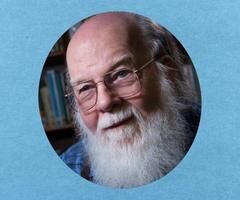We remember John O'Brien, whose ideas have had transformational social impact.
In 2025 we lost John O'Brien. Those who knew John knew him as wonderful friend and source of love and wisdom. Others will have been influenced by John, perhaps without even knowing. because John played a critical role in developing many of the most important innovations in policy and practice of our time. For Citizen Network he was the primary source of inspiration for everything we have done over the past 16 years. John was also our first Fellow and he continued to support our work until the very end of his life. To honour him and his contribution to creating a world where everyone matters we are publishing a series of articles that reveal different dimensions of his work.
Authors: Nan Carle, Simon Duffy, David Towell and Sally Warren
John O'Brien died in June. For 45 years he has been visiting the U.K. to help us figure out how best to build communities that work better for everybody. Nan Carle, Simon Duffy, David Towell and Sally Warren were among many partners in this work. Here they reflect on this history and celebrate John's continuing inspiration.

Several thousand people in the U.K. will recognise John O'Brien from this picture. In 1980 when the King's Fund was launching its influential initiative to close the institutions and ensure people with learning disabilities had the support necessary to live An Ordinary Life, David invited John here to help us learn from wider experience. Atlanta, Georgia is a long way but John came....and he kept coming to work with change leaders in different parts of Britain as we tried to make a reality of this philosophy in our communities. Crossing the Atlantic twice or more each year, he became a very valued colleague and mentor to many of us, as well as an expert on national rail!
John was a good story-teller but rarely gave lectures. Rather, a typical day involved people with different local roles - disabled people, family members, other allies, paid supporters, service managers, etc. - coming together to share their ideas and experiences and engage is serious reflection on what might better help people improve their lives. John had an amazing capacity for listening to these conversations and enabling us to build a fuller understanding of 'what more is possible'.
Complementing these processes, John was a deep thinker who played a key role in developing new concepts and practices that should still be central to our efforts. Of course, how we understand progress depends on our values. Drawing on Martin Luther King's philosophy of 'the beloved community', John was always focused on welcoming diversity and building communities that work better for everybody. Operationalising these values requires a framework for identifying positive outcomes in people's lives.
John offered us the five accomplishments:
Even better known, John has been the leading pioneer of Person Centred Planning, an approach to designing opportunities and support that puts individuals, their aspirations and needs first. In 2001, the Valuing People White Paper made this concept a foundation of national policy.
Central to An Ordinary Life is the opportunity to live like others in one's own place with good support. Advancing this agenda in the 1980s was greatly assisted by widespread participation in PASS workshops (Program Analysis of Service Systems is a tool that uses the principle of normalisation to assess how far the conditions are in place to live valued lives). John didn't originate PASS but helped Nan and others introduce the tool here - showing us more clearly how then, and still, so many of our services remain disappointingly institutional - and what we should do about this.
John encouraged us to see how the gap between aspiration and reality could drive inventiveness. In the 1990s, one significant innovation was the move away from group homes to what Sally now calls Support for Living. Sally's agency, Paradigm, has created the Reach Standards as a tool for ensuring that personal autonomy is at the heart of living in one's own home. Paradigm also sponsors the Great Support Movement as a way of raising the status of support workers and spreading understanding of what constitutes excellent practice. John continues to remind us that personal support should not be seen as a set of tasks and transactions but rather a pattern of respectful relationships within which people get the right support at the right time.
John also helped Simon, now a leader of Citizen Network, bring many of these ideas together in his work to link self-directed support with individualised funding and more broadly to reframe our goals in terms of everyday citizenship.
All this is only a small part of the story. In these and many other ways, John O'Brien has left us continuing inspiration for our efforts to support a better today and build a better tomorrow. He showed us what can be achieved through empathy, thoughtfulness, perseverance and the honesty to learn from experience.
Thank you, John.
The most useful overview of John's work is his 2015 book with Beth Mount: PATHFINDERS People with Developmental Disabilities and Their Allies Building Communities That Work Better for Everybody which is available to order from Inclusion Press, who have assembled a library of John's writing at inclusion.com
You can also read more about John O'Brien and his work here.
The publisher is Citizen Network. Goodbye & Thank You © Nan Carle, Simon Duffy, David Towell and Sally Warren 2025.
Deinstitutionalisation, Inclusion, intellectual disabilities, Person-Centred Planning, Personalised Support, Self-Directed Support, social care, social justice, Canada, England, Europe, Global, USA, Article